Hello again, I’m sorry it’s been so long since the last blog post. It’s been a pretty hectic time because of the start of Ramadan!
So I suppose my factoid for this blog post will be about Ramadan. Ramadan is a holy month (determined with a lunar calendar) in Islam practiced since the time of Muhammad. Each day during Ramadan, adult Muslims are required to fast from dawn to sunset – meaning no food and no water! There are of course exceptions for those who are sick or traveling. In addition, Ramadan in general is a time of heightened piety for Muslims in Oman and throughout the Muslim world. For example, lying, cursing, and talking behind someone’s back, while frowned upon at all times, are particularly discouraged during Ramadan. Even non-Muslim women in our class were asked to wear the full hijab, the head-covering that some Muslim women (and nearly all that I’ve seen in Oman) wear in public. Men were also asked to wear long-sleeves at all times. I definitely wasn’t expecting that, but I have no issues making small adjustments to respect the culture here, especially since I’m a guest.
Because of the fasting, many Muslims shift to a more nocturnal schedule during Ramadan. Muslims listen for a call to prayer to break the fast around 7:00 in Oman, and they eat a very small meal called Iftar to prepare for dinner. It’s customary to break one’s fast with a date as Muhammad did according to the writings about his life (known as the Hadith). Some Muslims eat the equivalent of a lunch at around 10:00, and then most eat a breakfast-like meal called Suhoor at 3:30 AM before another call to prayer at 4:00. Most I think sleep until 3:30 and get up briefly then, but some of the students in our group who are fasting just stay up until then.
My conversation partner Ibrahim suggested that I fast just for one day to see what it was like, so I fasted on the first day of Ramadan, last Thursday. I fasted the correct way – no water, no food, and not even any gum. It actually wasn’t unbearable, especially since we didn’t really do much that day. I decided to continue the next day – it wound up being pretty easy because I slept in until 3:30 PM, so I only had to fast for a few hours. I decided to stop though because I didn’t want to disrupt my ability to focus during class.
So anyways, a lot of interesting small things happened last week.
Last Tuesday, we had a Cultural Evening (Umsiyya Thaqafiya) at the Sultan Qaboos College for Teaching Arabic. We spent a few days after we got back from Muscat preparing for the evening, which consisted of two parts. One hour was made up of poster presentations like a science fair where we talked about any aspect of our respective cultures (in Arabic, of course!). My friend Eman, a Japanese-Egyptian student here presented on Japan with another American student who studied abroad there before. I talked about Blues and Rock music. There was also a presentation about the South with sweet tea, and another about Texas with guacamole. There were others displays as well as some made by Omanis about Ramadan and Omani food.
- Rock! Elvis Presley, Jimi Hendrix, and The Doors
- Blues! B.B. King and Robert Johnson
- The text for my displays.
The second half of the evening consisted of performances. As you might guess, I sung and played that classical guitar that I found earlier in the trip. My friends know I’ve really played this song to death, but since I have a new audience I could play it yet another time: Nobody Knows You When You’re Down and Out. Before I sang in English, I had to demonstrate my Arabic ability in some way, so I decided to translate the lyrics to Arabic and read them to the audience (which I think consisted of at least 100 people). I wasn’t planning to before, but I decided halfway through the song to try to sing in Arabic. The phrasing was a little weird, though, so I switched back to English in some parts.
There were some other performances from the students in our program. The students from Texas sang “Deep in the Heart of Texas”, and another read some poetry in Arabic. We were able to see some Omanis perform the ‘Azi (a traditional military exercise thing that’s really hard to describe), and the men in our group were even able to participate. At the end of the presentation I joined the group of performing Omanis with another student from our program, and I talked with all of them for almost an hour in Arabic about a few things like universities in the US, what there is to do in Manah, and studying Arabic. I caught a video as we were all parading out together.
The night was a lot of fun and a huge success. The next day we celebrated the 3rd anniversary of the college with a traditional Omani meal at lunchtime – beef that had been roasted in a fire pit called a Tanoor for 24 hours. According to everyone who ate some, it was delicious. I tried a couple pieces and wasn’t a huge fan, but I think that’s just because I have only really had one other bite of steak in my life (in Yellowknife).
- Marinating the head…
- Yummy
- The pit where the meat was roasted
- The finished product
- I reiterate – yummy
- Eating the Omani way!
- One of the bites that I had – looks like a good piece..?
Thursday, we had a presentation on Omani proverbs and learned about the traditional clothing for Omani men. The long garment is called a dishdasha and the turban a musar. There is also a cylindrical hat called a kumma that is worn by itself or under the musar.
- Obligatory…
- The new look.
We spent the weekend sleeping and shopping at the Souqs in Nizwa and Muscat. I was able to buy a dishdasha for only about 15 dollars!
- Breaking my vegetarian vows yet again at a Turkish restaurant in Muscat
- Strange but good rose and milk drink I got in Muscat
- How I’ll be dressing from now on (in America, too!)
Also, it’s rained here more times than I’ve expected (thrice).
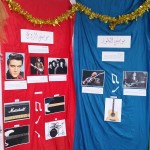
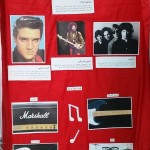
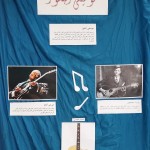
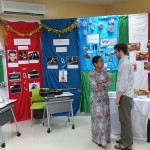
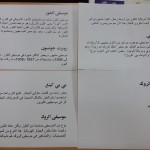
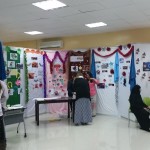
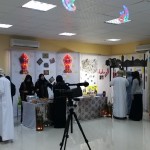
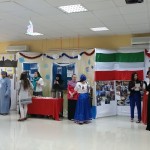
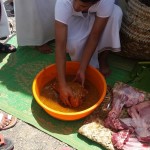
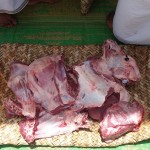
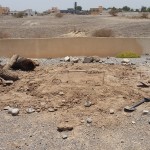
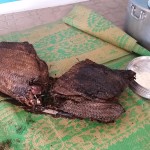
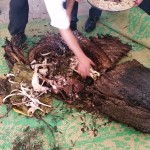
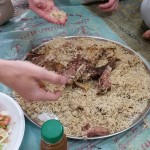
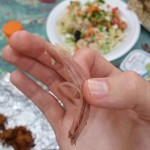
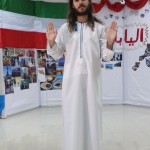
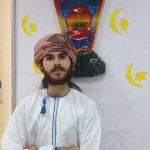
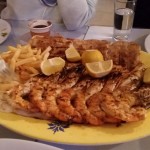
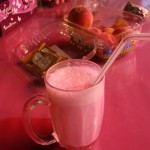
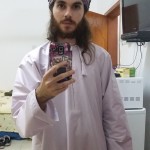
So glad to see that you’re sharing Elvis love in the Middle East!